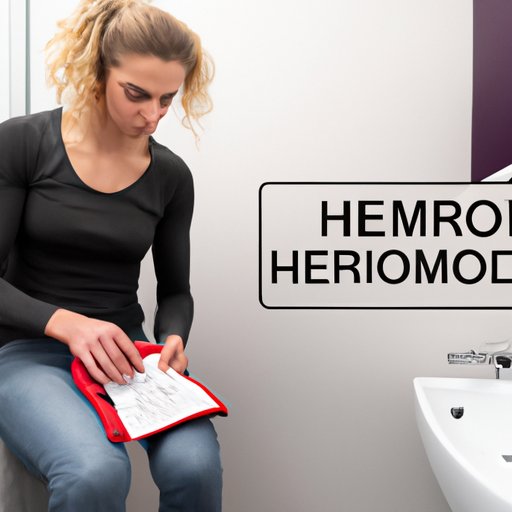
I. Introduction
Hemorrhoids are a common condition, affecting nearly half of all adults at some point in their lives. Hemorrhoids are swollen veins in the anus and rectum that can cause discomfort, pain, and bleeding. It is important to be able to recognize the symptoms and causes of hemorrhoids to help manage the condition and prevent it from developing into something more severe.
This article will provide you with a comprehensive guide on how to tell if you have hemorrhoids. We will cover the symptoms to watch out for, self-diagnosis tips, risk factors and causes, prevention methods, and treatment options.
II. Symptoms to Watch For
The most common symptoms of hemorrhoids include:
- Bleeding during bowel movements
- Itching or irritation in the anal area
- Pain or discomfort during bowel movements
- Swelling in the anal area
If you are experiencing any of these symptoms, it is important to consult a doctor to confirm whether you have hemorrhoids or a different condition.
Each symptom can be managed with home remedies, such as taking a warm bath or using over-the-counter creams or ointments. Drinking plenty of water and increasing fiber intake can also alleviate constipation, a common cause of hemorrhoids.
III. Self-Diagnosis Tips
It can be difficult to differentiate hemorrhoids from similar-looking conditions, such as anal warts or fissures. Here are some signs to help you distinguish between hemorrhoids and other conditions:
- Hemorrhoids are typically painless, but can cause itching and discomfort.
- Hemorrhoids are usually located in the outer rectum and anus.
- Hemorrhoids can be seen as small, swollen skin tags.
It is important to properly examine oneself to look for signs of hemorrhoids. Hemorrhoids can be diagnosed through a physical exam or through tests, such as a colonoscopy or sigmoidoscopy.
IV. Risk Factors and Causes
There are several risk factors for hemorrhoids, including:
- Constipation
- Pregnancy
- Obesity
- Prolonged sitting
- Straining during bowel movements
These risk factors contribute to increased pressure in the veins of the rectum and anus, causing them to swell and become painful. Other causes of hemorrhoids include anal infection, liver disease, and inflammatory bowel disease.
V. Prevention Methods
Lifestyle changes can help prevent hemorrhoids from developing. Here are some preventive measures:
- Increase fiber intake to soften stools
- Drink plenty of water
- Avoid prolonged sitting
- Avoid straining during bowel movements
- Exercise regularly to get the blood moving
During pregnancy, it is important to take preventive measures to avoid developing hemorrhoids. These include staying hydrated, exercising, and avoiding sitting or standing for extended periods of time.
VI. Treatment Options
Home remedies can be effective in treating mild cases of hemorrhoids. These include:
- Sitting in a warm bath for 10-15 minutes at a time
- Using over-the-counter creams or ointments to reduce itching and inflammation
- Taking over-the-counter pain relievers, such as ibuprofen or acetaminophen
- Using moist wipes or a squirt bottle to clean the anal area
If home remedies do not relieve symptoms of hemorrhoids, there are non-surgical and surgical options available:
- Sclerotherapy: Injecting a chemical solution into the hemorrhoid to harden and shrink it
- Rubber band ligation: Placing a rubber band around the hemorrhoid to cut off circulation and cause it to wither and fall off
- Hemorrhoidectomy: Surgery to remove large internal or external hemorrhoids
It is important to consult a doctor before attempting any treatment on your own. Severe cases of hemorrhoids may require medical care.
VII. Conclusion
Overall, it is important to recognize the symptoms and causes of hemorrhoids to help manage the condition and prevent it from developing into something more severe. Preventive measures, such as a high-fiber diet and exercise, can help prevent the development of hemorrhoids. If you suspect you have hemorrhoids, make sure to consult a doctor before attempting any treatment on your own.
Remember, prevention is key when it comes to hemorrhoids.




